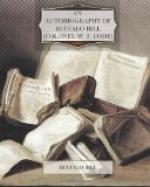Acting upon my suggestion, Lawrence Jerome, Livingston, Heckscher, Fitzhugh, Rogers, and Crosby, with myself as guide, rode through a convenient canon to a point beyond the herd, and to windward of them; the rest of the party made a detour of nearly five miles, keeping behind the crest of a hill.
We charged down on the buffaloes at full gallop, and just then the other party emerged from their concealment and witnessed the exciting chase.
The buffaloes started away in a line, single file; Fitzhugh, after a lively gallop, led us all. Soon he came alongside the rear buffalo, at which he fired. The animal faltered, and with another shot Fitzhugh brought him to the ground. Crosby dashed past and leveled another of the herd, while Livingston dropped a third. Those who were not directly engaged in the hunt now came up and congratulated the buffalo killers. Fitzhugh was hailed as the winner of the Buffalo Cup. There was general sympathy for Heckscher, whose horse had fallen and rolled over him, thus putting him out of the race.
The hunt being over, the column moved forward through a prairie-dog town, several miles in extent. These animals are found throughout the Plains, living together in a sort of society. Their numberless burrows in their towns join each other and the greatest care is necessary in riding among them, since the ground is so undermined as easily to give way under the weight of a horse.
Around the entrance to each burrow earth is piled to the height of at least a foot. On these little elevations the prairie-dogs sit on their haunches, chattering to each other and observing whatever passes on the Plains.
They will permit a person to approach very closely, but when they have viewed him they dive into their holes with wonderful celerity. They are difficult to kill. If hit they usually succeed in getting underground before they can be recovered.
Rattlesnakes and little owls are found in great numbers in the prairie-dog towns, living in the same burrows. We killed and cooked a few of the prairie-dogs, and found them very palatable.
A short distance beyond the prairie-dog town we found a settlement of five white men. They Proved to be the two Clifford brothers, Arthur Ruff, Dick Seymour, and John Nelson. To the last I have already referred. Each of these men had a squaw for a wife and numerous half-breed children. They lived in tents of buffalo skins. They owned a herd of horses and a few cattle, and had cultivated a small piece of land. Their principal occupation was hunting, and they had numbers of buffalo hides, which they had tanned in the Indian fashion.
Upon reaching Pleasant Valley on Medicine Creek the party divided into two detachments, one hunting along the bank of the creek for elk and deer, the other remaining with the main body of the escort.




